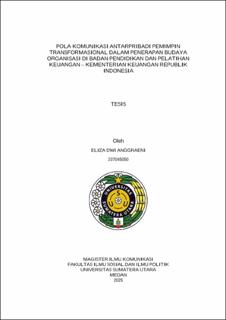| dc.description.abstract | The objective of the research is to analyze interpersonal communication pattern of transformational leaders, the form of message interpersonal communication of transformational leaders, and the obstacles in interpersonal communication of transformational leaders in implementing organizational culture at the Financial Education and Training Board, the Ministry of Finance of the Republic of Indonesia. The theory used in this research is the theory of interpersonal communication by Joseph A. DeVito. The research uses qualitative research method. The informants are five transformational leaders at the BPPK with the criteria as follows: the officials at the Financial Education and Training Board who have the structural position of echelon IV above, verified as transformational leaders of BPPK (confidential and limited data are kept at the Human Resource and Internal Obedience Department), implement the flexible policy of the work place. The data are gathered by conducting in-depth interviews and documentary study. The result of the research shows that interpersonal communication of transformational leaders in implementing organizational culture at the BPPK, the Ministry of Finance of the Republic of Indonesia is by using balance split pattern. The form of message of interpersonal communication used by transformational leaders in implementing organizational culture at the BPPK, the Ministry of Finance of the Republic of Indonesia is persuasive and informative messages. Some of the obstacles in interpersonal communication by transformational leaders in implementing organizational culture at the BPPK, the Ministry of Finance of the Republic of Indonesia include 1) physiological noise, a slow response, and other activities besides the main job, 2) psychological noise, prejudice and difference in viewing something, 3) physical noise, distance and lack of devices, and 4) semantic noise, ambiguity and unclear message. | en_US |


